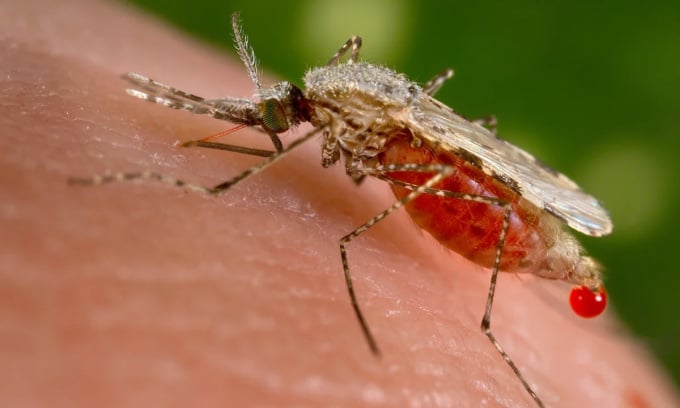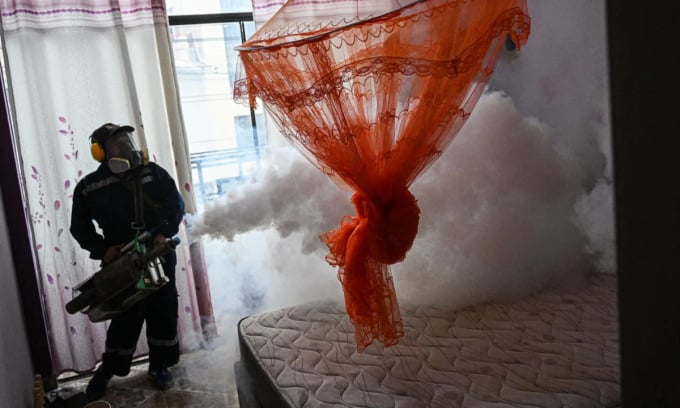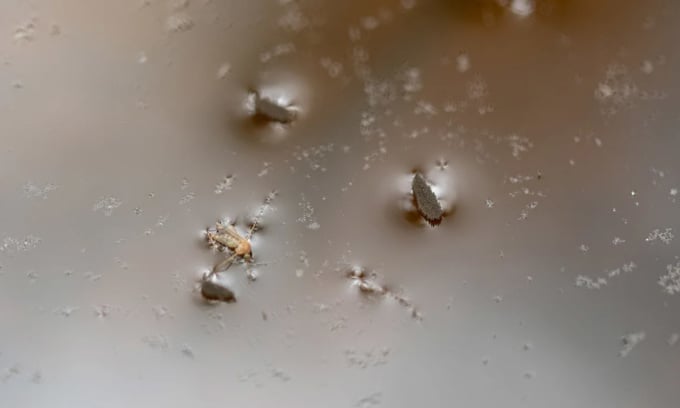Rising temperatures create favorable conditions for mosquitoes to breed, develop, and spread disease in places where they previously could not live.

An Anopheles stephensi mosquito, which can carry the malaria pathogen, is feeding on human blood. Photo: James Gathany/CDC/Handout/Reuters
There are few winners in the climate crisis, but scientists are fairly certain that mosquitoes are among them, CNN reported on June 29. These insects thrive in warm, humid environments. Climate change is making heatwaves more frequent and intense. However, so are storms and floods. These events leave behind stagnant pools of water, where most mosquitoes breed.
Rising temperatures allow mosquitoes to develop faster and live longer. Previously, they would have died during harsh winters in many places, but now they have a higher chance of survival and more time to develop their populations. Heat also shortens the time it takes for parasites or viruses to mature inside mosquitoes.
"The higher the temperature, the shorter that process becomes. Therefore, mosquitoes not only live longer but are also able to transmit disease sooner," said Oliver Brady, associate professor at the London School of Tropical Medicine and Hygiene.
Mosquitoes also benefit from the heat in other ways. When it's hotter, more people tend to go outside in the mornings and late afternoons – prime times for mosquitoes.
High temperatures also prompt cities to increase green spaces for cooling, but this can also provide ideal new breeding grounds for these blood-sucking insects.
In the U.S., the number of "mosquito days"—days with hot, humid conditions that mosquitoes love—has increased, according to an analysis by the non-profit research organization Climate Central. Researchers examined 40 years of data at nearly 250 locations and found that more than 70% of them have become more mosquito-friendly.
In sub-Saharan Africa, where malaria has had devastating consequences, climate change is helping mosquitoes expand their range significantly. On average, Anopheles mosquitoes that transmit malaria move about 6.5 meters higher and nearly 5 kilometers further south each year, according to Georgetown University.
Colin Carlson, a biologist at Georgetown University, said that this is the rate at which things are happening after climate change and could have major consequences for areas that were previously unaffected by malaria and are not prepared to respond.

A worker sprays insecticide to repel Aedes aegypti mosquitoes to prevent the spread of dengue fever in a neighborhood in Piura, northern Peru, on June 11, 2023. Photo: Ernesto Benavides/AFP/Getty
Dengue fever, another potentially deadly disease, could also increase as the world warms. Peru is grappling with its worst dengue outbreak on record, with around 150,000 people infected and more than 250 deaths.
Experts believe that unusually high rainfall and temperatures have created ideal conditions for mosquitoes. Scientists have not yet precisely assessed the role of climate change in the outbreak, but Carlson noted that the link appears quite clear.
Currently, dengue fever is "knocking on the door" of Europe and the US. "Another billion people will be living in conditions conducive to dengue fever spread, and the majority of them are in temperate Western Europe, the US, and China," Carlson said.
However, the US and Europe are still unlikely to experience major outbreaks or large numbers of deaths from dengue fever. "The narrative about future change really has more to do with a sharp increase in areas already experiencing dengue outbreaks, where the disease will become much worse," Brady said.
He pointed out that China and certain parts of India are at particularly high risk. "It's a really scary situation because there are so many people living there and even small changes could lead to disaster," he said.
Communities already on the front lines of the climate crisis will always be most severely affected by mosquito-borne diseases, according to Shannon LaDeau, a pathological ecologist at the Cary Institute for Ecosystem Studies.
The spread of these diseases to regions like the US and Europe could still be a shock. "People living in temperate zones will face significant lifestyle changes because they've never had to worry about this before," LaDeau noted.

Mosquito eggs float next to a dead mosquito on the water's surface in a trap set by the Louisville Metro Health and Medical Services in Louisville, Kentucky, on August 25, 2021. Photo: Jon Cherry/Getty
The climate crisis isn't just benefiting mosquitoes. Some places may become too hot for them. "There's a threshold that, if exceeded, the chemicals in their bodies stop working. The bad news is that these places may also become too hot for humans," LaDeau said.
Experts still have many unanswered questions about how mosquitoes respond to the climate crisis. Gossner stated that the relationship between climate change and disease is complex. According to Carlson, humans know a lot about how temperature changes affect the ability of mosquitoes to transmit disease, know little about the speed at which mosquitoes migrate to new places, and know very little about the growth of mosquito populations in general. Currently, scientists are working to develop tools to better assess the link between mosquito-borne diseases and climate change.
Thu Thao (According to CNN )
Source link














































































































Comment (0)